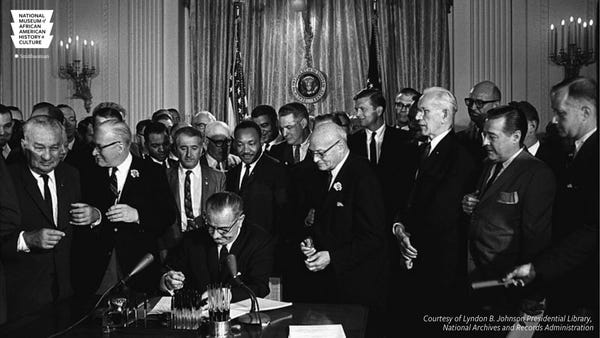Happy Birthday, Civil Rights Act!
An optimistic post for a holiday Friday! How? Who knows!
Today, the Civil Rights Act turns 57!
On this day in 1964, LBJ signed the Civil Rights Act — the first federal law to ban discrimination on the basis of race, color, religion, sex, or national origin.
Because, yes, it took us 188 years to get around to doing that.
We still haven't lived up to the lofty goals the Civil Rights Act champions. But, today, the Civil Rights Act remains one of the most important laws in the country for protecting people's rights in their everyday lives. Along with the Voting Rights Act (which we are all watching flail helplessly after having been all-but murdered by the Supreme Court), the Civil Rights Act is one of the most successful pieces of legislation in American history. Even still, the Civil Rights Act is still what stops businesses from refusing to serve Black people, hire women, or speak to immigrants.
The sad truth is that we couldn't pass the Civil Rights Act today, even with Dems holding the presidency and both houses of Congress. When it got to the Senate, Joe Manchin and Kyrsten Sinema would say that "protecting the filibuster" was far more important than making sure their constituents have "rights."
In a way, the filibuster preventing civil rights legislation today is poetic. Because the filibuster almost killed the Civil Rights Act back in the '60s.
Strom Thurmond led the 75-day filibuster against the Civil Rights Act, which he actually called "cruel and unusual punishment," for, I guess, white people? Thurmond was joined by his fellow extreme white supremacists in the Senate — including the man Joe Manchin lauds and looks to for guidance on the filibuster, West Virginia Senator and not-yet-reformed-KKK-member Robert C. Byrd. Senators William Fulbright and Sam Ervin also joined in.
But finally, on July 2, 1964, the Senate was able to break the filibuster, and passed the Civil Rights Act with 73 yes votes. It was the first time in US history that the Senate was able to get a civil rights bill past the filibuster — a legacy that we are still dealing with today.
It's a sad fact that, even today, civil rights are politically unpopular. From voting to employment to just trying to live their lives, people of color, women, immigrants, religious minorities, and LGBTQ people, among others, deal with discrimination, harassment, and attacks. Here in 2021, just two percent of the LGBTQ population lives in a state that protects them from housing discrimination. Voting rights for people of color and poor people are under attack nationwide. And the Supreme Court thinks it's just fine for employers to refuse to give women reproductive healthcare.
Fun fact: Women weren't supposed to be included in the Civil Rights Act. Congressman Howard Smith, who introduced the amendment, joked about it on the House floor. As chronicled by The New Yorker,
Smith made his motion in a jocular spirit. He read a letter from a constituent who asked him to offer an additional amendment addressing the demographic imbalance between men and women—a "grave injustice" that abrogated the right of every woman to have a husband of her own. Emanuel Celler replied that he knew all about equality for women. He had been married for forty-nine years, he said, and he usually had the last two words: "Yes, dear." The jokes continued until [Congresswoman Martha] Griffiths got the floor. "If there had been any necessity to have pointed out that women were a second-class sex," she said, "the laughter would have proved it."
For years, even the newly created EEOC didn't take the CRA's prohibition against sex discrimination seriously. But now, 57 years later, it protects not only women, but also LGBTQ people from being discriminated against simply because of who they are.
Obviously, we still have a long way to go (the 2016 election, alone, is proof enough of that). Our civil rights are under attack on a daily basis, everywhere from local school board meetings to the United States Supreme Court. And I am absolutely terrified of where things are going. But today — just today! — let's not despair about everything terrible that is happening. Instead, let's look to the Civil Rights Act as both inspiration and motivation — and aspire to truly live up to its promise.
Thanks for 57 great years, Civil Rights Act. I hope we can protect you for many more decades to come.
Follow Jamie on Twitter!
Do your Amazon shopping through this link, because reasons .




Little babbies crying for memaw.
she's giving some major side-eye to whoever is taking the photograph